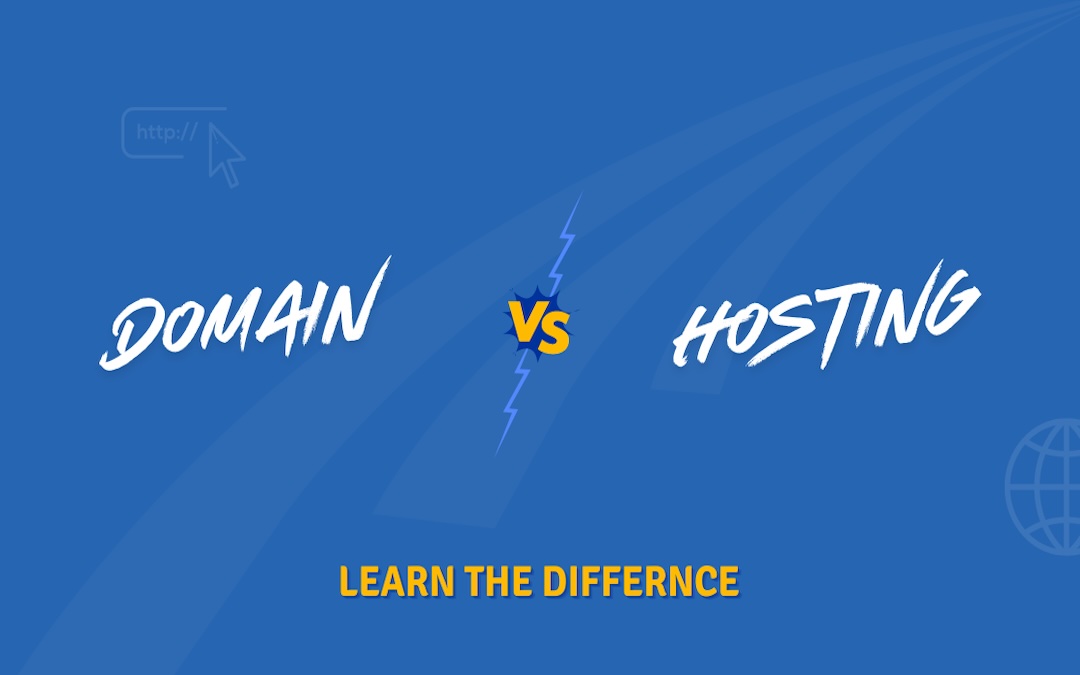
Web hosting is the house and the domain name is the address. To have a functional website, you need both, a domain name and web hosting. Let us learn about domain names and web hosting, and how they differ.
Domain Names: Your Website's Identity
A domain name is your distinct website address on the internet. It is what you enter in the address bar of your browser. You reserve that particular website address when you purchase a domain name. In other words, a domain name is a special collection of characters that aids in identifying your website on the internet. It's the URL visitors type in to reach your site.
To claim your address online, register your domain name with a domain registrar. This process typically involves paying an annual fee to reserve the name for a specific period.
Types of Domain Extensions:
Domain names typically end with a Top-Level Domain extension like .com, .org, or .net. Among the popular options is .com, which is commonly used for commercial websites. .org is often used by nonprofit organizations and educational institutions. Also, .net is typically used for websites related to technology and networks. .info is also commonly used for informational websites. Country-code TLD extensions include .in for India or .uk for the United Kingdom targeting specific geographic locations and others.
Web Hosting: The Foundation of Your Website
Web hosting is a service that provides storage space for your website's files and makes them accessible to visitors on the internet. When someone types your domain name into their browser, their computer connects to the web server where your website is stored, and the server delivers the files to their browser.
Benefits of Web Hosting
A web hosting provider offers many different services to ensure your website's smooth operation, including:
- Server uptime: it guarantees your website is accessible to visitors most of the time.
- Security measures: Protect your website from cyber-attacks and data theft.
- Email hosting: Allows you to create professional email addresses associated with your domain name (e.g., [email protected]).
- Website management tools: Provides user-friendly interfaces for uploading content, managing files, and maintaining your website.
Types of Web Hosting
Different types of hosting plans cater to varying website needs. Here are some common options:
- Shared Hosting: It is the most affordable option because multiple websites share resources on a single server. It is Ideal for small websites with low traffic.
- Virtual Private Server Hosting: VPS Offers dedicated resources within a shared server environment, providing more control and performance for websites with moderate traffic.
- Cloud Hosting: This utilizes a network of servers to offer scalability and reliability. Perfect for websites experiencing fluctuating traffic or expecting rapid growth.
- Managed WordPress Hosting: It provides an optimized environment for WordPress websites, with features and tools specifically tailored to this popular Content Management System (CMS).
The pricing for web hosting depends on the type of hosting, the amount of storage space and bandwidth required, and the features included in the plan.
What is Domain Hosting?
The major functions of domain hosting, a specialized service, are domain name registration and management. Domain hosting is all about safeguarding and protecting your website's online address, as opposed to web hosting, which offers infrastructure and storage for the content of your website.
The Perfect Match: Domain Names and Web Hosting Working Together
A domain name and web hosting are required to construct a website. One is not possible without the other. The Web hosting offers the room to store the files for your website, while the domain name serves as the address.
You must link your domain name registration and hosting package after making your selections. This procedure involves setting up the DNS (Domain Name System) for your domain name so that it points to your web hosting server. This instructs the internet as to where the files that comprise your website can be found.
You may purchase a hosting package and register your domain name at the same time due to the combined services offered by many web hosting companies. This guarantees that everything is set up right from the beginning and speeds up the procedure.
Conclusion
Domain names and web hosting are two essential components for creating a website. A domain name serves as your website’s unique address, making it easily identifiable online, while web hosting provides the storage and infrastructure to keep your site accessible to visitors. The two must work together to ensure your website functions properly. Many providers offer both domain registration and web hosting services, simplifying the setup process. By understanding the roles of each, you can make informed decisions to establish and maintain your website effectively.
Share this post
Leave a comment
All comments are moderated. Spammy and bot submitted comments are deleted. Please submit the comments that are helpful to others, and we'll approve your comments. A comment that includes outbound link will only be approved if the content is relevant to the topic, and has some value to our readers.

Comments (0)
No comment